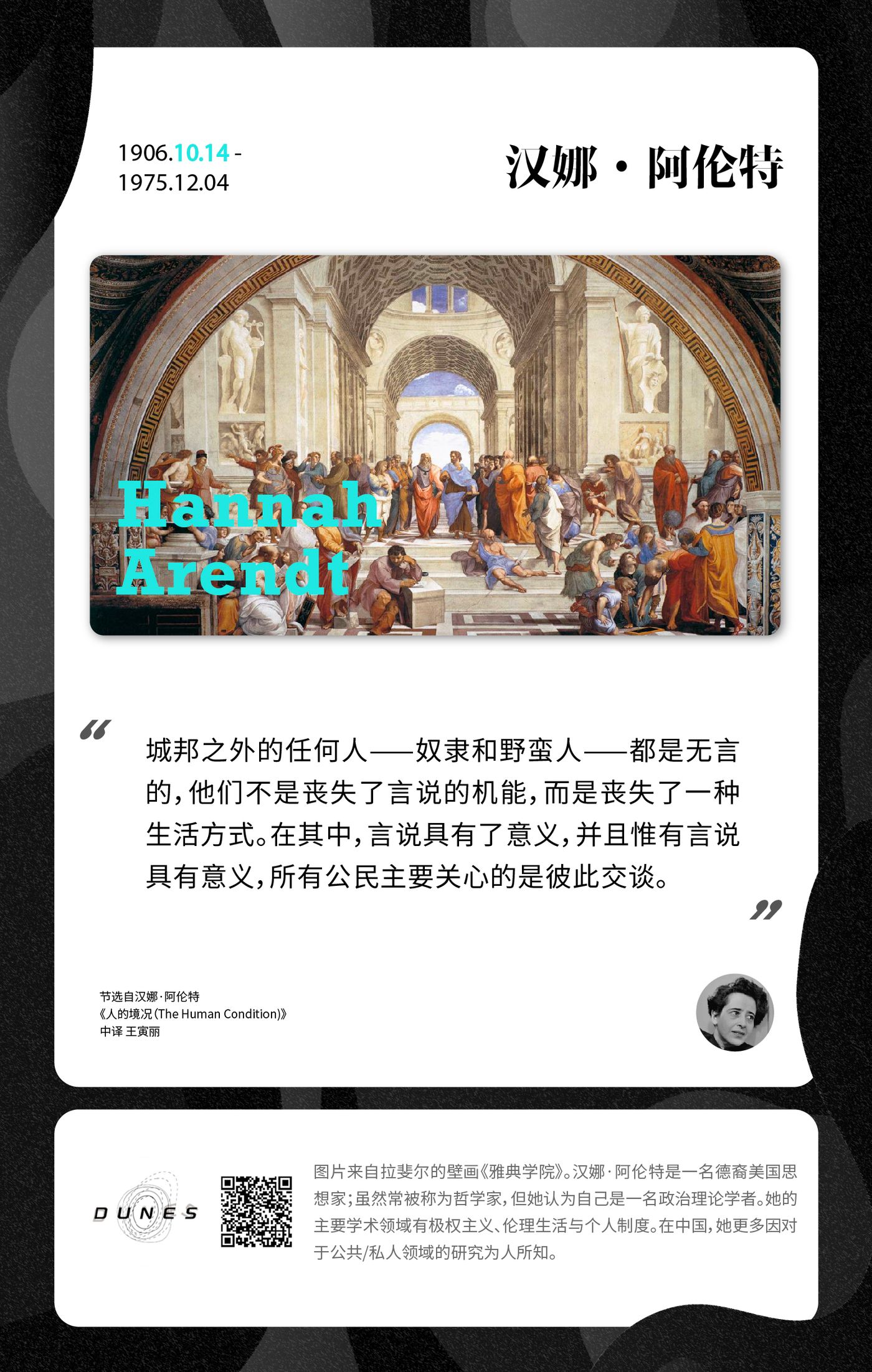Arendt: Talk to each other, understand things, love specific people
114 years ago today, Hannah Arendt was born.

01 Citizens speak and talk to each other
(From Hannah Arendt, The Human Condition, Chapter "Public and Private Realms", Chinese translation: Wang Yinli)
Aristotle's "political animal" (zoon politikon) was first translated as "social animal" (animal socialis), especially via the standard translation adopted by Thomas Aquinas: homo est naturaliter politicus, id est, socialis. ( Humans are by nature political, i.e. social.)
The unconscious replacement of the word "politics" by "society" exposes the loss of the original Greek understanding of politics, since the word "society" is of Roman origin and has no counterpart in the Greek language.
Aristotle's definition of man as a political being is opposed to the natural connection in family life because man is a "speaking being" (zoon logon ekhon). The phrase, translated in Latin as "animal rationale", is based on a fundamental misunderstanding like "social animals".
Aristotle does not mean to show the highest power of man, which for him is not "logos," that is, speech or reason, but "nous," the power of contemplation, and contemplation. Precisely its content cannot be put into words.
According to Aristotle's two definitions of man, anyone outside the city - slaves and savages - is speechless (aneulogou), not having lost the ability to speak, but a A way of life in which speech has meaning, and only speech has meaning, all citizens are concerned with talking to each other.
02 Write for understanding, not influence
(From a 1964 conversation between Hannah Arendt and Gunter Gaus entitled What Remains? Chinese translation: Dune Institute)
- Gaussian:
To a large extent, your work has to do with understanding the conditions under which political action takes place. Do you want to have a broad impact with these works? Do you believe that, in this day and age, such an effect is no longer possible? Or are these influences just secondary to you?
- Arendt:
This is not an easy question. But honestly, when I work, I don't care how it affects people. For me, the most important thing is to understand things, and writing is an integral part of the process of understanding things.
- Gaussian:
Does writing help you become more aware of things?
- Arendt:
Yes, because something is built up during the writing process. If I have a good memory and can retain all my thoughts, there is a chance that I won't write anything down. I understand my laziness.
- Gaussian:
If there is such a memory?
- Arendt:
Yes. but I do not have. What matters to me is the thought process itself. Whenever I manage to fully think about something, I feel satisfied. It would also satisfy me if I managed to adequately express my thought process in writing.
You asked about the impact of my work on others. If I may use sarcastic terms - the question itself is masculine. Men want to be "influential". Suffice to say, I make this judgment as a bystander. As for saying I consider myself influential? No, what I want to do is understand things. If other people understand the world in the same way that I understand it, that will give me a satisfaction, a satisfaction in some kind of equality.
03 Love concrete people rather than abstract collectives
(From a 1964 conversation between Hannah Arendt and Gunter Gaus entitled What Remains? Chinese translation: Dune Institute)
- Gaussian:
You once said, " I have never loved any nation or group in my life, neither Germany nor France nor America, nor working class or anything else. In fact, I only love mine Friends. I'm totally incapable of loving any other non-specific kind. Especially, love for Jews, that's questionable because I'm a Jew myself."
Can I ask something? Although this attitude is legitimate and worthy of respect, doesn't man, as a politically active being, require a commitment to some kind of collective? Can't this commitment be extended to "love" to a certain extent? Aren't you concerned that your attitude is politically unconstructive?
- Arendt:
No, I would say that opposing views are unconstructive. Of course, we may have a long discussion on this topic.
It is first and foremost a natural condition for people to belong to a group. Everyone is always born to belong to a certain group. But what we're talking about now, in the second sense—belonging to a collective—that is, an organized group, are two completely different concepts.
This organization is always related to the relationship between man and the world. That is, people within an organization have common, often so-called interests, so here their interests really relate to their relationship with the world. A direct personal relationship, so to speak, "love," which of course exists first and foremost in actual love and, in a sense, also in friendship - which directly involves a person, and has nothing to do with their relationship to the world. So we can say that people from completely different organizations can still be personal friends. But if one confuses these things, if one brings the concept of "love" to the negotiating table, to put it more bluntly, I think it is absolutely fatal.
Click here to open the original public account push, welcome to pay attention
Like my work? Don't forget to support and clap, let me know that you are with me on the road of creation. Keep this enthusiasm together!



- Author
- More